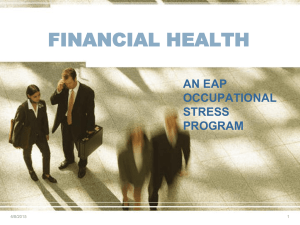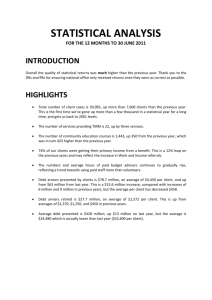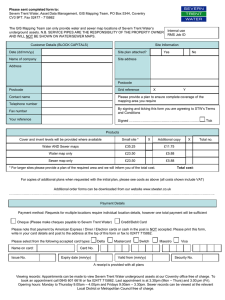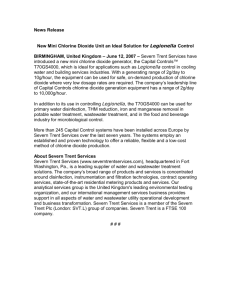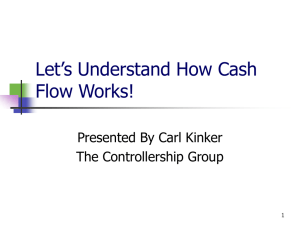Water Advice Toolkit for Advisers
advertisement
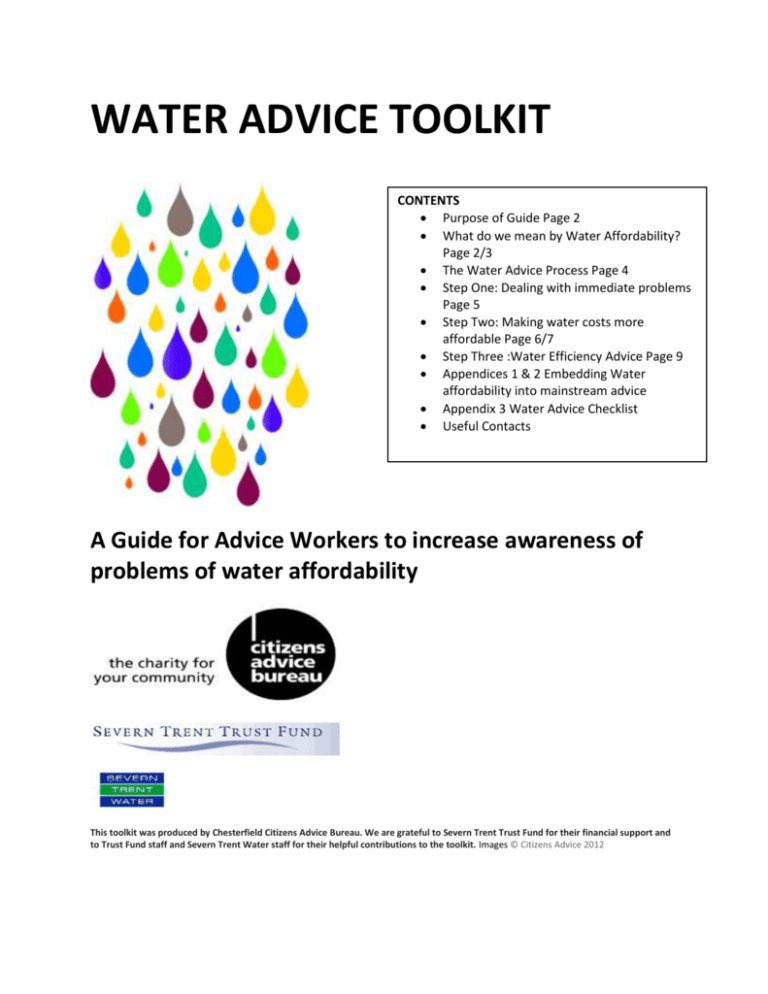
WATER ADVICE TOOLKIT CONTENTS Purpose of Guide Page 2 What do we mean by Water Affordability? Page 2/3 The Water Advice Process Page 4 Step One: Dealing with immediate problems Page 5 Step Two: Making water costs more affordable Page 6/7 Step Three :Water Efficiency Advice Page 9 Appendices 1 & 2 Embedding Water affordability into mainstream advice Appendix 3 Water Advice Checklist Useful Contacts A Guide for Advice Workers to increase awareness of problems of water affordability This toolkit was produced by Chesterfield Citizens Advice Bureau. We are grateful to Severn Trent Trust Fund for their financial support and to Trust Fund staff and Severn Trent Water staff for their helpful contributions to the toolkit. Images © Citizens Advice 2012 Purpose of the Guide To increase awareness amongst advisers of the problem of water affordability and the availability of measures to address this need including the Severn Trent Trust Fund. To provide advisers with a structured method to deal with water affordability and water problems Why do some people find it difficult to manage the cost of water? Low levels of income Rising costs of living Budgeting issues and financial management Disability results in additional use of water Large family results in higher than average water use Paying for water using the wrong billing regime: charged by rateable value rather than metered supply What do we mean by Water Affordability? There is no official definition of Water Affordability. In 2002, a report from the Chartered Institute of Environmental Health used a threshold of households paying more than 3% of their disposable income on water charges. This definition has been adopted in subsequent reports and reviews, most recently in the Walker Independent review of household charging and metering for water and sewerage costs. A pilot scheme took place between December 2005 to August 2007 involving a partnership of DEFRA, Consumer Council for Water, OFWAT and South West Water. The pilot scheme adopted the threshold set by the Chartered Institute of Environmental Health as the measure of affordability. Households with water affordability issues were targeted with support including benefit checks, advice about water schemes, water audits and water efficiency advice. As a result, the percentage of households spending 3% or more of disposable income on water fell from 53% to 45%. Recently Chesterfield CAB produced a social policy report entitled “utility poor”. In a small scale survey we gathered information regarding household spend on energy, water and phones from clients presenting to the bureau in general financial difficulty. In this survey, seven out of ten households were paying 3% or more of income on water and the average water spend was 4.5% of disposable income. Impact of Water Affordability Although domestic customers cannot be disconnected for non payment, we know water affordability has serious consequences: It can lead to debt; resulting in stress and adverse affect on mental health It can contribute to the causes of not being able to meet other financial commitments If water charges are paid within rent, non payment may result in eviction for rent arrears Where households pay by metered supply, they may self ration water usage; to the detriment of their health Water - Role for Citizens Advice Bureaux and Advisers OFWAT reported that water companies increased water bills on 1 April 2012. The average rise was 5.7%, but in one region it was 8.8%. For Severn Trent Water customers the increase was 5% currently STW have the lowest average combined charge. Bad debt is said to add an average of £15 to every water customer’s bill and Government is committed to tackling this bad debt to lower bills. The outstanding revenue from unpaid water bills was £705 million in 1998/9 rising to £1.635 Million in 2010/11. OFWAT have indicated that 80% of people in water debt live in rented property. In 2008/9 the number of enquiries received by Citizens Advice about water debts was 63,535 rising to 86,094 by 2011/12 (representing an increase of 36%). General enquiries about water have fallen from 14,935 in 2008/9 to 12,812 in 2011/2. Water affordability is not just a debt related problem. It can be aggravated by a variety of circumstances, many of which are affecting clients such as low income, poor mental or physical conditions in private rented properties with landlords reluctant to make improvements or install energy efficiency measures. Other relevant factors could include difficulty understanding bills, language difficulties, learning difficulties or lack of support. It is against this backdrop that Advisers can: Help clients to resolve their existing water debt problems and improve awareness of the Severn Trent Trust Fund. Help clients find the most appropriate water charging and payment method for them. Help clients access national schemes to improve water affordability Provide information about how to access water efficiency measures to keep future bills down Work preventatively through social policy work to improve policies and practices, ensuring that less people end up in crisis in the first place. THE WATER ADVICE PROCESS Step One : DEAL WITH ANY IMMEDIATE WATER DEBT Step Two: MAKING WATER COSTS MORE AFFORDABLE Step Three: PROVIDE OR REFER TO WATER EFFICIENCY ADVICE STEP ONE: DEAL WITH ANY IMMEDIATE WATER DEBT USE DEBT ADVICE MODEL 1. ADVICE ON LEGAL POWERS OF DEBT RECOVERY AND OPTIONS FOR PAYMENT Domestic customers cannot be disconnected for water arrears. If someone is unable to agree a repayment arrangement, the water company may apply to County Court for a CCJ or register a default against the client. If water charges are paid as part of inclusive rent to local authority or social landlord, repayment needs greater priority 2. REVIEW INCOME AND EXPENDITURE This is the basis for a repayment offer and key to making an affordable offer. Consider any offer towards water arrears in context of other debts and overall financial circumstances. Debt resources such as the NEDCAB Moneysite http://mymoney.nedcab.org.uk/moneyadvice/ are particularly effective. If a householder is receiving key means tested benefits then consider direct deduction from benefit to cover ongoing water costs and repayment of arrears, 3. STRESS IMPORTANCE OF ONGOING CONTACT WITH THE WATER COMPANY Water Companies are less likely to take court action where there is ongoing communication and there is a shared understanding of the household’s financial pressures or personal circumstances. CHECK FINANCIAL SUPPORT AVAILABLE 1. BENEFITS CHECK OR GRANTS CHECK-SELF CHECK OR USING TURN2US WEBSITE 2. CHECK WHETHER CHARITABLE TRUST CAN HELP- information about all utility company schemes can be found at http://www.birdandcodev.co.uk/auriga/wpcontent/uploads/2012/12/Auriga-Schemes.pdf CONTACT WATER COMPANY 1. Have notes of exactly what you want to say BEFORE you contact the company 2. BE CLEAR ABOUT WHAT YOU ASKING FOR- THIS MIGHT INCLUDE TIME TO WORK OUT A COURSE OF ACTION/ PAYMENT OFFER OR YOU MAY BE ABLE TO RESOLVE THE MATTER IMMEDIATELY 3. EXPLAIN PERSONAL CIRCUMSTANCES OF YOUR CLIENT AND INDICATE ANY RELEVANT REASONS FOR GETTING INTO DEBT 4. REFER TO DEBT COLLECTION CODES OF PRACTICE (INDIVIDUAL WATER COMPANIES) OR GOOD PRACTICE (OFWAT) STEP TWO: MAKING WATER COSTS MORE AFFORDABLE OR SUSTAINABLE There is presently no provision to switch supplier to access lowest cost charges. CONSIDER CHANGE FROM A ANON TOAMETER CHARGE CONSIDER CHANGING FROM NONMETERED METERED TO METER CHARGE Financial gains can be made by changing to a metered charge if people don’t use much water or live in property with a high rateable value. A good rule of thumb is that someone could pay less if there are fewer people in their property than there are bedrooms. Householders will be responsible for paying for any water that leaks. Charges are not normally made for the first leak in an underground supply pipe. The water company will be able to advise if the customer can save with a water meter, ask the agent you speak to. Water companies do not charge for installing water meters except in exceptional circumstances. Many water companies have water usage calculators on their website, to help people work out how much they are likely to pay if they have a meter. If you find you are not better off after changing to a meter, you can usually revert to rateable value if you have the meter removed within 24 months from 1st April 2015. If any change of occupier occurs then the new occupier cannot revert to rateable value CHECK FOR THE SINGLE CHARGE IF AELIGIBILITY METER IS NOT POSSIBLE, CHECKPERSONS ELIGIBILITYASSESSED FOR THE SINGLE P This helps single people who are unable to have meter fitted to benefit from reduced water charges. The charge reflects that they are likely to consume less water than multiple occupied premises. It is only available to those people who have applied and are advised they cannot have a metered supply. If it is not possible to install a meter the customer can request to go onto an assessed charge, (for properties for more than one occupier) speak to the water company for full details once it has been ascertained that a meter can’t be fitted. CHECK ELIGIBILITY FOR THE WATER SURE SCHEME The Water Sure scheme helps some people with a metered charge with their water bills. Eligibility is restricted to households receiving key benefits and who need to use a lot of water either for medical reasons or because their household has 3 or more children under 19 years and in full time education. Qualifying benefits presently include: Income Support, Income based jobseekers allowance, Housing benefit, Council Tax benefit, Pension credit, Working tax credit, Child tax credit (other than the basic element) and Income related employment and support allowance, Universal Credit and from 1st April 2015 will include DLA and PIP. Householders need to be on a water meter. If you get help through the Watersure scheme, your water bill will be capped. This means you will not pay any more than the average household bill for the area your water company deals with. In some cases, your normal metered water bill could be less than your company's Watersure cap. If this applies to you, you can still go onto the scheme to ensure that your water charges will never go above the average charge regardless of how much you use, if you use less that £329 per year then you will be charged the amount you use. STW WaterSure charge for 2015/2016 is £ 329 Some householders meet the basic rules of eligibility for Water Sure except that they do not have a water meter. It is possible for them to apply for a meter & then immediately apply for Water Sure. You would need to have carefully assessed that this is financially advantageous for the household. If the rateable value bill is less than £329 then it is not recommended that households have a meter fitted then request WaterSure. CHECK AND RESPOND TO NEED FOR BUDGETING HELP OR ADVICE ON PAYMENT METHODS Help may be needed to budget regularly for the cost of water. Current payment methods for water may not suit the way they manage money. There are different payment frequencies and methods so that people can choose the one that is best for budgeting. Typical examples include paying the bill in weekly, fortnightly or monthly instalments, twice yearly or in full at the beginning of the charging year. Water companies can set up special arrangements at the request of individual customers. A realistic payment agreed needs to be achievable and capable of being maintained. If someone is in arrears and receive certain benefits, they may be able to have payments taken directly from their benefits. This is scheme is called 'Water Direct' and is operated by the Department for Work and Pensions. A choice of payment methods available includes direct debit, cash, cheque, credit/debit card, payment card or on-line. Water companies offer a range of locations where a bill can be paid. Examples include banks, post offices, and paypoint/payzone outlets. Please note that there is a charge for customer paying via the Post Office. You can find your local PayPoint at http://www.paypoint.co.uk/paypointlocator Check sources of budgeting help in the bureau or look at budgeting section on Money Advice Website ‘@ North East Derbyshire CAB http://moneysmart.nedcab.org.uk or Money Saving Expert. Severn Trent Water has produced a number of excellent leaflets available on request. These include: “We’re here to help you” “Water Sure Scheme” “Getting on top of your water bill” WATER AFFORDABILITY FLOWCHART How is your water charge worked out? NON METER ASSESS WHETHER CHEAPER WITH METERED SUPPLY CHECK WHETHER SINGLE PERSONS ASSESSED CHARGE APPLIES IF METERED SUPPLY NOT POSSIBLE METERED CHARGE CHECK WHETHER WATER SURE SCHEME APPLIES IF CHANGED TO METER IN LAST 24 MONTHS- IS NON METERED CHARGE CHEAPER? REFER FOR WATER EFFICIENCY ADVICE CONSIDER NEED FOR BUDGETING MEASURES MAXIMISE INCOME BY CHECKING BENEFIT ENTITLEMENT CONSIDER WHETHER CHARITABLE TRUST COULD HELP STEP THREE: WATER EFFICIENCY ADVICE OR SPECIAL ASSISTANCE There are a range of helpful tips and information available to support people to become more efficient with their water use. Please See: http://www.aurigaservices.co.uk/wpcontent/uploads/2012/12/AurigaWaterSavingTips.pdf and http://www.aurigaservices.co.uk/wp-content/uploads/2012/12/AurigaEnergySavingTips.pdf The Energy Saving Trust has produced some tips about how to be efficient with use of watersee http://www.energysavingtrust.org.uk. A water saving calculator shows the cost of water in every room in house and savings available. http://www.energysavingtrust.org.uk/Heating-andhot-water/Saving-money-on-hot-water/Water-Energy-Calculator. STW top tips for saving water and Guide to Saving Water - http://www.stwater.co.uk/households/save-water/top-ten-watersaving-tips/. Order free water efficiency devices from STW – http://www.stwcc.savewater.co.uk/ There are a range of `behavioural` measures people can take. By cutting your time in the shower by two minutes the average home could save £20 a year. People can make other changes too, such as only using a washing machine on when it’s full or using a watering can instead of a hose pipe. Advisers are not primary source of water efficiency advice but if aware themselves, can help people source appropriate advice and support. Many water companies offer free water and energy saving devices or kits that could help cut water bills. People may wish to be more `water aware` when they have to consider the need to replace appliances, taps and showerheads. It is a good idea to consider how efficient any replacement item will be. For example, when people need to replace the washing machine or dishwashers, they could source products with the Water wise Marque and the Energy Saving recommended mark, as these will be the least expensive to run. Water companies offer `extra care` services- assistance so that customers are not put at a disadvantage because of age, disability or illness. This may include moving a meter to give better access or issuing bills in suitable formats for you. Severn Trent Water`s extra care service is called 'Access'; Services include – Bills and communications in alternative formats & languages Doorstep password scheme Nominee scheme Dialysis & medical conditions – this service lets the company know that should there be an issue with water supply then these customers need extra support. Meter reading service Minicom and BT Relay service APPENDIX ONE: INCORPORATING ADVICE ABOUT WATER THROUGHOUT CORE ADVICE TOPICS Advisers are aware that problems faced by people, often go way beyond the initial `presenting` problem offered. Trying to address problems is a key part of our offer of `holistic advice. Advisers should be aware that many presenting problems could impinge on water affordability and vice versa. Opportunities exist to use holistic advice to develop water affordability advice in general advice cases. CORE ADVICE TOPIC Benefits COMMON ADVICE REQUEST IMPLICATIONS FOR ADVISING ABOUT WATER Client asking for help with a claim form for the benefit Disability Living Allowance. Debt Client overwhelmed by multiple credit debt problems Employment Client has experienced problems after being put on short term working by their employer Finance Client does not have a functioning bank account following debt Health Client released from hospital- has a disability that results in substantial use of water Client lives alone in house too large to manage comfortably Extra costs of disability may challenge budget including paying for water. Advice needed on securing lowest water charges. Guidance on water efficiency may help. Water Sure scheme may help Affordability of water may impinge on ability to repay credit and debt. Advice would be helpful to ensure water charges as low as possible. Trust Fund Application may be considered if significant water debt. Unexpected reduction in income; may not be able to afford ongoing water charges. Possible need for negotiation with Water Company and benefits check Current methods of paying for water may be ineffective and not support budgeting. Wider advice about budgeting, water payment methods and financial inclusion may help General budgeting help and benefits check could help. If on metered water supply, check eligibility for Water Sure scheme. Potentially paying disproportionately high water charges and other expenses. Advice needed on securing lowest water charges. Guidance on water efficiency may help. General budgeting help and benefits check could help Likely to need intensive support; particularly debt negotiation and budgeting. Advice needed on securing lowest water charges. Trust Fund Application may be considered if significant water debt. Housing Relationships Clients partner has left, leaving them with responsibility for several unpaid debts including water GET FREE TRAINING ON ALL ASPECTS OF WATER AFFORDABILITY; BOTH SEVERN TRENT WATER AND THE TRUST FUND ARE ABLE TO PROVIDE QUALITY TRAINING TO ADVICE WORKERS. ASK THEM! APPENDIX TWO: IDENTIFYING PEOPLE WHO MAY BENEFIT FROM WATER ADVICE WHERE PRESENTING PROBLEM IS NOT ABOUT WATER. WATER ADVICE RELEVANCE IMPLICATIONS FOR ADVISING ABOUT WATER Single people May have low water consumption living alone People with large family People with disability May have large water consumption May have large water consumption In multiple credit debt Budgeting Expenditure on water may exacerbate financial worries Unplanned expenditure on water may exacerbate water worries Check value in moving to metered supply or whether qualify for single persons discount Check all measures for reducing or containing water cost Check Water Sure Scheme Check entitlement to benefits Check Water Sure Scheme Check all measures for reducing or containing water cost Check entitlement to benefits Check all measures for reducing or containing water cost Check payment methods help rather than hinder budgeting. Check measures to improve water affordability Water Sure Scheme Check entitlements to benefits and grants Check all measures for reducing or containing water cost Charitable Trust Application could be considered Debt repayment negotiation/budgeting assistance Check all measures for reducing or containing water cost Low Expenditure on water may Income/Benefits exacerbate financial worries Crisis or Change of life experience May be left with unplanned bills including for water, that have not previously budgeted for A simple measure to adopt: Identify your clients in debt who are spending more than 3% of income on water. Offer all those people a full `water advice` check identified in this pack. It could make a big difference! APPENDIX THREE: WATER ADVICE CHECKLIST FOR USE BY ADVICE WORKERS Name/reference Adviser Date Water Company Current payment method for Water? Water arrears (identify any action taken) Are there other types of debt? Income source and amounts (any benefits) Any health conditions or disabilities? Family status Housing status WORK PLAN Does the household have need for? 1. Advice on managing water debt? Yes No Not Applicable 2. Advice on managing affordability of water? Yes No Not Applicable 3. Advice on water efficiency? Yes No Not Applicable 4. Support on budgeting? Yes No Not Applicable 5. Income maximisation/benefits advice? Yes No Not Applicable Useful Contacts Severn Trent Water Contact details: http://www.stwater.co.uk/ Billing Enquiries (Mon - Fri, 8am - 8pm & Sat 8am -1pm) telephone number 03457 500 500 Website Address: http://www.stwater.co.uk/households/save-water/ Severn Trent Trust Fund Contact details: Telephone: 0121 355 7766 STTF website: www.sttf.org.uk Postal address is - Severn Trent Trust Fund FREEPOST RLZE-EABT-SHSA Sutton Coldfield B72 1TJ Energy Saving Trust Contact details: http://www.energysavingtrust.org.uk/ Telephone: 0300 123 1234 OFWAT The economic regulator of the water and sewerage sectors in England and Wales Contact details: http://ofwat.gov.uk/ Consumer Council for Water Consumer Council for Water (CCW) – represents domestic and business water consumers Contact details: http://www.ccwater.org.uk/ Derbyshire Consumer Hub Contact details: http://www.derbyshireconsumerhub.info/
